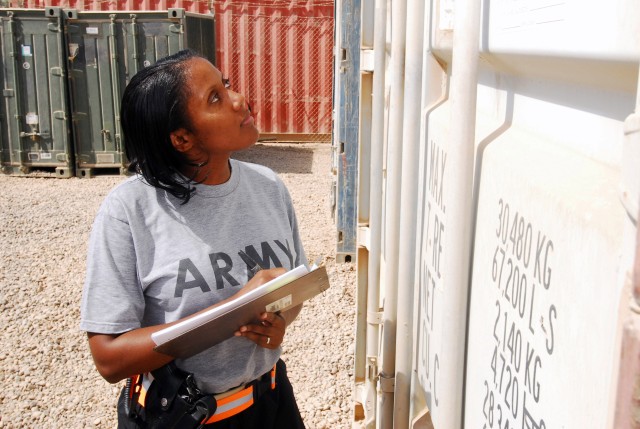
Staff Sgt. Grace Williams, Victory Base Complex Garrison Container Manager, recently attended a container management conference in Kuwait where she learned that the Department of Defense has spent more than 640 million dollars on the purchase and leasing of containers in support of Operation Enduring Freedom and Operation Iraqi Freedom.
"When the containers that are leased are not returned on time to the companies, the government is charged a detention fee each day, these fees are a part of the 640 million, and accountability can reduce the amount we spend," Williams said.
The Kansas City, Kan. native from the 326th Area Support Group trains representatives, called Container Control Officers, from each unit on the Integrated Booking System- Container Management Module.
"The user role is the most important because the system is only as good or as accurate as the information they are inputting," explained Williams.
The accountability of containers has been a requirement from U.S. Central Command since 2003. The Container Element, Camp Arifjan, Kuwait is the headquarters for tracking containers being shipped in and out of Iraq and Afghanistan.
The CCO from each unit is responsible for inventorying their containers once a month to ensure they are seaworthy and accounted for. By the 20th of each month the container control officer from that unit will input the information to the IBS-CMM.
Each forward operation base in Iraq is required to maintain accountability of 90 percent of their containers. Last month each of the camps here at VBC accounted for more than 90 percent.
On top of reducing the impact of detention fees and the cost of lost containers there is also the value of its contents to consider.
"Because of the cargo the containers hold it's that much more important for us to know where it's coming from, where it's going, who it belongs to and who the point of contact is," Williams said.
There are roughly 12,000 containers here on VBC. Approximately 700-900 containers are either coming or going through VBC each week. It is up to the five Container Control Officers assigned to each Mayor Cell, Staff Sgt. Grace Williams and the individual units to make the flow is as smooth as possible.
The CCO should be inspecting the containers for dents, wholes, rust spots, anything that could result in the container becoming unseaworthy.
"It may seem mundane until a unit redeploys, then it seems important to everyone, that's when unit's care," Williams said.
A unit's equipment will only make it as far as Kuwait in an unseaworthy container.
"When the Coast Guard inspects them at the port, they will refuse anything that may let water into the container. At that point the unit will have to request another container, unload their cargo, inventory it and reload it into another container, dragging out the process for getting home," Williams said.
Along with the integrity of the container CCOs also ensure all markings, tags and tracking numbers are still clearly visible.
"The electronic tags are only used at ports, so once it leaves Kuwait it will be tracked by the container number."
When a unit's equipment is shipped via Joint Base Balad or VBC in a container with worn down markings, the container and all that it holds may never make its final destination.
The VBC garrison container manager said that as of March 21 there were 85,037 containers in Iraq, 40 percent of which the status or condition was unknown.
"Either units don't know they have to account for their containers as property book items or they do know and don't make it a priority," Williams said.
Training on the IBS-CMM system and the process of container management is available every Monday at 1430 on Camp Victory, Building 13 conference room. Contact Williams at grace.williams@iraq.centcom.mil or DSN 318 485-2300 to schedule training for a representative from your unit.

Social Sharing